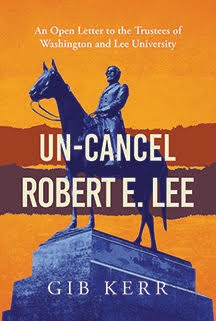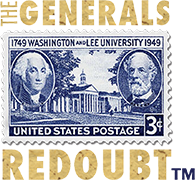Was Robert E. Lee a Traitor?

In recent years, Lee has been targeted relentlessly by cancel culture. Most of these attacks have been unfair, blatantly biased, and/or factually inaccurate. I wrote Un-Cancel Robert E. Lee to address the hackneyed allegations against Lee and to share the facts—the truth—about the man.
One of the most oft-repeated criticisms of Lee is that he was a traitor. He took up arms against the United States, his detractors cry, and violated his oath to protect and defend the Constitution. This over-simplified conclusion conveniently ignores the fact that Virginia had seceded—against Lee’s wishes, by the way—and that citizens in those days commonly believed that their first allegiance was to their native state, not to the United States.
The treason charge against Lee further ignores the conditions leading up to Virginia’s election to secede. Virginia had been overwhelmingly opposed to seceding until Lincoln announced plans in April of 1861 to raise an army of 75,000 soldiers to invade the South to put down the rebellion. (Lincoln took this action without consulting Congress, raising additional constitutional questions). Lincoln’s bellicose stance led directly to Virginia’s decision to leave the Union and hence to Lee’s decision to defend his home state.
Lee, along with Jefferson Davis, was indicted for treason but was never tried or convicted. The central question for the charge of treason was whether the Southern states had the right to secede. The Constitution is silent on the subject, and the question was settled via armed conflict rather than through the courts.
Following are excerpts from the chapter “Was Lee A Traitor?” from Un-Cancel Robert E. Lee:
Treason is defined by the Constitution in Article III, Section 3 as follows: “Treason against the United States, shall consist only in levying War against them, or in adhering to their Enemies, giving them Aid and Comfort.” Obviously, the Confederates levied war against the United States. The issue of treason, however, is muddied by the question of whether the Confederates remained citizens of the United States at the time of the war—having withdrawn from the Union by the secession of their states—and as such no longer owed allegiance to the United States.
Treason, as it turns out, is complicated.
———————————————————–
In her 2017 book Secession on Trial: The Treason Prosecution of Jefferson Davis, University of Virginia legal history professor Cynthia Nicoletti points out that the Constitution was silent on the question of whether states had the right to secede from the Union. A strong case was built by Davis’s attorney, Charles O’Conor—himself a Northerner—that the Southern states had acted within their constitutional rights to secede and that a trial might not only exonerate Davis, but largely nullify the Union’s justification for waging war against the Confederacy.
In short, a failed prosecution of Davis risked inflaming passions in the immediate postwar period when the North and South were struggling to bury the hatchet and reunite as one nation.
———————————————————–
Richmond, Virginia,1865
In the house on Franklin Street, where a constant stream of visitors called on Lee—so many, in fact, that he required screeners to limit the intrusions—he yearned to escape the forlorn city. He hoped for “some little quiet home in the woods, where I can procure shelter and my daily bread, if permitted by the victor. I wish to get Mrs. Lee out of the city as soon as practical.”[1]
But Lee’s dreams of peaceful retirement would have to wait. On June 7, a federal jury in Norfolk indicted Lee on treason charges, which were punishable by death. Lee sought the help of General Grant, writing to him that “I had supposed that the officers and men of the Army of Northern Virginia were, by the terms of the surrender, protected by the United States Government from molestation so long as they conformed to its conditions.”[2]
Grant was forced to intercede with the new president, Andrew Johnson, and many of his advisors who wanted to see Lee tried for treason. Grant argued forcefully that the terms of Lee’s surrender eliminated the possibility of treason charges, and that the generous terms at Appomattox had helped avert a prolonged guerilla war. Grant had given his word to Lee, and he felt so strongly that Lee should be spared that he threatened to resign if Lee were put on trial. Eventually, Johnson agreed to Grant’s request. Grant shared this good news in a letter to Lee on June 20, but the uncertain specter of treason charges would hang over Lee for the next three years.
It was during that time that Lee began to encourage other former Confederates to bury the hatchet and pledge their loyalty to the United States. As always, he led by example. He applied for restoration of his US citizenship in June and, later that year, signed an oath of allegiance. His paperwork, however, was mishandled in Washington and was not discovered for another century. When found in the National Archives in 1970, Lee’s application was posthumously processed, with bipartisan congressional support, and signed by President Gerald R. Ford in July 1975.
In his speech at Arlington restoring Lee’s citizenship, Ford praised him for his efforts to reunite the nation in the aftermath of the Civil War. Ford cited a letter that Lee had written to a former subordinate in 1865, saying, “This war, being at an end, the Southern States having laid down their arms, and the questions at issue between them and the Northern States having been decided, I believe it to be the duty of everyone to unite in the restoration of the country and the reestablishment of peace and harmony.”[3]
In a letter to General P.G.T. Beauregard in October 1865, Lee addressed the topic of whether the former Confederates should take an oath of allegiance and apply for US citizenship. Of course, he encouraged Beauregard to follow his own example:
True patriotism sometimes requires of men to act exactly contrary, at one period, to that which it does at another, and the motive which impels them—the desire to do right—is precisely the same. The circumstances which govern their actions change; and their conduct must conform to the new order of things. History is full of illustrations of this. Washington himself is an example. At one time he fought against the French under Braddock, in the service of the King of Great Britain; at another, he fought with the French at Yorktown, under the orders of the Continental Congress of America, against him. He has not been branded by the world with reproach for this; but his course has been applauded.[4]
Lee, like most Americans of his age, viewed Washington as the ideal—the heroic model citizen and soldier. Nearly every American home at that time prominently displayed an image of George Washington. Lee had direct personal ties to Washington through his father, Light Horse Harry Lee, who served as an officer under Washington in the Revolutionary War, and through his father-in-law, George Washington Parke Custis, who had grown up at Mount Vernon in the shadow of his adopted grandfather.
When considering his course of action in the spring of 1861, he certainly must have asked himself what Washington would do if he were in Lee’s shoes. Few knew more about Washington than Lee did. Washington, in the eyes of the British, was a rebel. If captured, he would have been hanged. Yet he and his fellow revolutionaries risked their lives, their fortunes, and their sacred honor to fight for liberty. Southerners, including Lee, saw many similarities between their fight for independence and the American Revolution. If you would like to order a copy of Un-Cancel Robert E. Lee, it is available on Amazon at Un-Cancel Robert E. Lee
For donors of $500 or more to The Generals Redoubt, we will send you a copy of Un-Cancel Robert E. Lee signed by the author. (Please provide your mailing address). If you are in Lexington, the book is also available at the University Bookstore.
Gib Kerr ‘85
The Generals Redoubt
To receive your signed copy, please reply with your pledge, along with your name, mailing address, and phone number. Your contribution will support our ongoing efforts to sponsor speakers, programs, and other initiatives in Lexington that will advance our mission to preserve the history, traditions, and values that made W&L great. All contributions received between now and January 31, 2024 will be matched up to $400,000 by a group of generous supporters!
You may contribute via credit card at https://www.thegeneralsredoubt.us/support or check per information in italics below. WE NEED YOUR HELP! To donate by check please make payable to: The Generals Redoubt and mail to: The Generals Redoubt, P.O. Box 1097, Lexington, VA 24450. Thank you. The Generals Redoubt (TGR) is a non-partisan 501 (c) (3) organization that is not aligned with, nor supports, any political party, individual, or organization.
[1] Thomas, 369.
[2] Thomas, 370.
[3] Freeman, Volume IV, 221.
[4] Thomas, 370.
